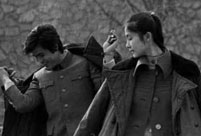DHAKA, Dec. 12 -- Bangladesh has executed Abdul Quader Molla, an Islamist party leader convicted of war crimes in 1971, which is the first execution of a war criminal in the country. In protest against Molla's execution, his party Jamaat called countrywide dawn-to-dusk general strike for Sunday.
The death sentence of the war crimes accused Molla, assistant secretary general of Bangladesh Jamaat-e-Islami Party, was executed hours after the Appellate Division dismissed his plea to review the Supreme Court verdict that confirmed the capital punishment on Sept. 17 this year.
The dismissal paved the way for executing the Jamaat leader who was finally hanged at 10:01 p.m. (local time) Thursday night.
A Dhaka Central Jail official who preferred to be unnamed said "it was at 10:01 p.m. local time when a relevant official dropped a handkerchief from his hand to give signal to the hangmen."
Molla's hanging came just three days before Bangladesh celebrates its 42nd Victory Day which falls on Dec. 16.
In his immediate reaction Mohammad Ali, conducting prosecutor at International Crimes Tribunal (ICT)-2, told reporters that "We' re very happy in sight of the pro-liberation spirit and the values of 1971."
Defense counsel Tajul Islam said, "I still believe Molla was innocent. I would just say history will judge this."
Security measures have been beefed up in Dhaka and elsewhere in the country to avert any untoward situation.
Violence flares anew across Bangladesh after the country's apex court Thursday rejected the review petition filed by the condemned war criminal who was all set to be executed until a dramatic last gasp intervention saved him from the gallows late on Tuesday.
A five-member bench of the Appellate Division headed by Chief Justice Md Muzammel Hossain passed the order, clearing the way for executing the war crimes accused Molla.
In its brief verdict, the Supreme Court said, "There is no scope to accept Molla's review petition."
Chief defense counsel Abdur Razzaq then said, "let us receive the full verdict. He can not be executed until the release of the full verdict. And we have time until Dec. 23 for filing mercy petition as per jail code."
But Attorney General Mahbubey Alam said, "the jail code will not be applicable in case of Molla."
Bangladesh's Supreme Court (SC) Wednesday adjourned till Thursday morning the hearing on the acceptability of the review petition filed by the condemned war criminal.
About one and a half hour before the convicted war criminal was to hang, Justice Syed Mahmud Hossain, a SC chamber judge, stayed the execution of the Jamaat leader until 10:30 a.m. local time Wednesday shortly after the defense counsels Tuesday night submitted a petition to the chamber judge against the verdict of the apex court that sentenced Molla to death for committing crimes against humanity during the 1971 Liberation War.
Justice Hossain was one of the five members of the Appellate Division bench that sentenced Mollah to death, overruling the judgment of International Crimes Tribunal-2 that had earlier awarded him life.
The International Crimes Tribunal (ICT)-2 Sunday evening issued the death warrant for Molla amid a wide spread debate among lawyers on whether the Jamaat leader has the right to move a review petition before the apex court.
Senior Superintendent of Dhaka Central Jail, Farman Ali, told reporters Tuesday night at around 8 p.m. local time that "the death sentence would be carried out at 12:01 a.m. (local time) on Wednesday."
The country's Supreme Court (SC) Thursday released the full text of the verdict of the Appellate Division bench, which awarded death penalty to Molla on Sept. 17.
The apex court's Sept. 17 verdict came more than seven-months after the ICT-2, set up to try those allegedly involved in war crimes during Bangladesh's nine-month liberation war in 1971, sentenced the Jamaat leader to life term imprisonment.
After the ICT-2 sentenced Mollah to life imprisonment on Feb. 5 for his war crimes, hundreds of people, mostly pro-ruling party men, flocked to Shahbag square, an iconic place in Bangladesh's capital Dhaka, demanding death penalty for crimes against humanity in 1971.
The demonstration, which transformed into a large people's movement, forced the government to amend the International Crimes (Tribunals) Act-1973 on Feb. 17 to ensure the rights of the state to appeal on behalf of the war crimes victims of 1971.
The state on March 3 appealed to the SC against Molla's sentencing, claiming that the punishment was inadequate, and sought the death penalty. The defense appealed a day later seeking acquittal on all charges.
Mollah was indicted in May last year with six specific charges for his alleged involvement in murders and mass killings in 1971.
 Heavy cargo flights taking off
Heavy cargo flights taking off In pictures: PLA's digital equipment
In pictures: PLA's digital equipment  Americans mark Thanksgiving Day with parades
Americans mark Thanksgiving Day with parades Love searching stories in cities
Love searching stories in cities  Shanghai shrouded in heavy fog
Shanghai shrouded in heavy fog Office ladies receive ‘devil’ training in mud
Office ladies receive ‘devil’ training in mud Changes in Chinese dancing culture
Changes in Chinese dancing culture  Highlight of Mr Bodybuilding and Miss Bikini Contest
Highlight of Mr Bodybuilding and Miss Bikini Contest  Picturesque scenery of Huanglong, NW China
Picturesque scenery of Huanglong, NW China Youths in Night club: photo story
Youths in Night club: photo story Models dazzle at Int'l Yacht Model Pageant
Models dazzle at Int'l Yacht Model Pageant  Visa-free islands for Chinese passport
Visa-free islands for Chinese passport Tianjin holds first pole dance championship
Tianjin holds first pole dance championship  Annual Santa Claus parade held in Canada's Montreal
Annual Santa Claus parade held in Canada's Montreal China's aircraft carrier passes through Taiwan Strait
China's aircraft carrier passes through Taiwan StraitDay|Week|Month